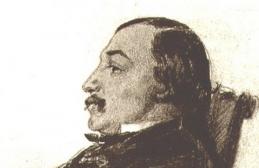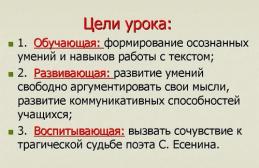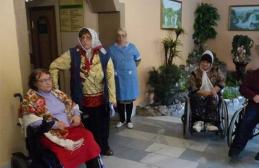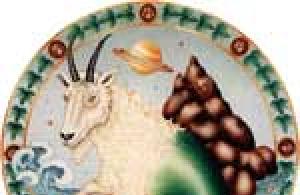It would seem difficult to imagine more different heroes than
Khlestakov and the mayor in N.V. Gogol’s comedy “The Inspector General”. Many
their differences from each other are immediately striking. In my own way
social status, the heroes are far removed from each other and
in the normal course of events they should not occur at all. Mayor
- a man “aged in service”, he began his career
from the lower ranks and all his life, hard but steadily rose through
career ladder until he took the main position in the district
city. Anton Antonovich firmly established himself in this post, tidied up
the whole town is in control and no one is going to do it anytime soon
give up power. Khlestakov, on the contrary, has a small rank, “elis-
a simple waste,” in the words of his servant Osip, and even then he failed
stay in one of the St. Petersburg offices and, after walking
with his father's money, he is forced to return to the village.
The characters' characters are quite consistent with their position. Mayor
behaves respectably, his speech is leisurely and serious, his words
significant. He is an experienced man, he knows how to portray an honest and simple-minded man
campaigner, so you won’t immediately guess that it’s big
rogue The mayor is cunning and calculating, with ordinary people he doesn't
stands on ceremony, but can, if necessary, look polite. Khlestakov
but he is an “empty” person, “without a king in his head,” he is absolutely
does not think about the consequences of his words and thoughts. Khlestakov is driven by
primitive thirst for pleasure, which he reports completely
openly: “After all, you live to pick flowers of pleasure.”
Gogol emphasized that his hero is not at all a clever swindler,
but just an extremely frivolous young man.
The appearance of the characters is also quite consistent with their personalities.
The respectable mayor has a short haircut and is dressed in a uniform, and Khlestakov
spends his last money on fashionable hairstyle and "particular
dress,” just to throw dust in the eyes of the neighboring landowners.
In a word, at first glance, the heroes are completely different in social
position, both in character and in appearance. And yet
something unites them, otherwise Khlestakov would not have been able to settle on
rights of a dear guest in the mayor's house and for some time it was as if
change places with the "city father". There is, of course, a specific
the reason for this turn of events is the “unpleasant news” that
that an auditor from St. Petersburg should secretly come to the city. However
Khlestakov looks so little like an important official that the experienced
The mayor should have seen through it right away. No route from St. Petersburg
into the village, neither the capital's costume could be introduced for a long time
the mayor is misled. The reason for the long-standing misunderstanding
lies elsewhere.
Let's remember how the heroes behave when they first meet. They both
tremble with fear of each other, and fear, as we know, has “eyes
great." What causes mutual fear between Khlestakov and the mayor?
Khlestakov never thought in advance about responsibility for
your actions. In St. Petersburg, he was engaged not in service, but in entertainment,
spent his father's money in a week and then sent Osip
sell a new tailcoat at a flea market. On the way home Khlestakov
lost completely at cards and by the time he met with the mayor he had already
the second week I lived in a hotel on credit. Naturally he was scared
arrival of an important person, because he decided that he was being arrested and sent
to prison.
The reasons for the mayor’s fear are much more serious. Already from the first
action comedy it becomes clear to us that a high position
for Anton Antonovich - a means of illegal enrichment.
The mayor shamelessly takes bribes, robs merchants, commits arbitrariness,
embezzles government money and does not care about execution
service, but about concealing their crimes. The rest are a match for the boss
officials in the city: a judge dealing primarily with
hunting, trustee of hospitals where people recover “like flies”,
a postmaster who reads other people's letters out of curiosity... Such subordinates
only add fear, and do not calm the mayor.
As a result, general fear gives rise to a completely absurd situation:
Khlestakov begins to babble some fantastic nonsense
about their significance, and the officials, led by the mayor, play along
him, imagining that they managed to escape from the auditor. They even rejoice
when Khlestakov, becoming more and more impudent, takes bribes from them. Khlestakov himself
poorly understands why the mayor and officials are creeping
in front of him, the townspeople are making some petitions, so
even Osip is forced to notice to the owner that, apparently, he was mistaken for
someone else. Having listened to the advice of a clever servant, Khlestakov
leaves the city, and manages to blithely propose
daughter of the mayor and receive the blessing of her parents. Like
the type of behavior received the name after the publication of the comedy
"Khlestakovism". It is curious that the mayor also becomes infected with “Khlestakovism”
": having seen off his future son-in-law, this experienced campaigner suddenly
begins to fantasize about the rank of general, orders, secular
life in St. Petersburg is no worse than Khlestakov. The more devastating it is
the mayor's unexpected discovery that Khlestakov was not
auditor, but “icicle”, “rag”.
So, we are convinced that, despite the obvious differences between the heroes
V social status and characters, they are united by fear of
punishment for dishonest acts. Gorodnichy and Khlestakov makes
their selfishness, reluctance to work conscientiously, habit
live at the expense of others. Gogol emphasizes that such types are not
the exception, but the rule. Mayor, Khlestakov and all the other heroes
comedies only submit to those unjust orders that
reign in Russia. They are accustomed to living by deception and therefore they themselves often
find themselves deceived. It wasn’t Khlestakov who outwitted and scared
mayor and officials, and they themselves were confused in their own
fears and lies.
What do Khlestakov and the mayor have in common in N.V.’s comedy? Gogol "The Inspector General"
In the comedy “The Inspector General” N.V. Gogol presented a whole gallery of officials - swindlers, thieves in uniform, but special attention deserve Khlestakov and the mayor, written very vividly and convincingly.
What makes Khlestakov and the mayor in common - these, it would seem, are completely different people- different in age, social status and mental development? What do the tall, well-fed, important Skvoznik-Dmukhanovsky and the small, frail Khlestakov have in common? From the “very intelligent in his own way” mayor and the “stupid” Khlestakov?
What they have in common is that both of them, and this is the main thing, are representatives of the bureaucratic world, endowed with everything characteristic of this world negative qualities. They are vain and ambitious, selfish and unscrupulous, notorious liars, swindlers and bribe-takers, unwilling to work conscientiously, accustomed to living by deception. Both lackeys by nature,They know how to adapt to the situation and please if necessary.
So, Skvoznik-Dmukhanovsky, and Khlestakov - unscrupulous peoplescammers, bribe takers.
The mayor in the city entrusted to him behaves like a district king. He not only shamelessly robs merchants and townspeople, but also calmly pockets the money allocated by the state for the construction of the church. He is a swindler, a deceiver, “who has deceived three governors in his time.” By embezzling government money, he cares not about performing his service, but about concealing his crimes.
We learn that the mayor takes bribes from city residents and his subordinates at the very beginning of the comedy from a letter from his godfather: “... you, like everyone else, have sins, because you are a smart person and don’t like to miss what floats into your hands..."
Khlestakov, as soon as he felt the favorable attention of officials towards him, also behaved like a king. Just like the mayor, he began to shamelessly take money, supposedly for a loan, becoming more and more impudent, he begged a large amount money, knowing that he will not return it.He takes money from the mayor, and even after promising to marry his daughter.
One more common feature- arrogance.
The mayor looks down on both city residents and officials.With both of them he is often rude and unfair: “Shh! these clubfoot bears- boots are knocking! It just falls down, as if someone were throwing forty pounds off a cart! Where the hell is taking you? Feeling his power and impunity, he engages in arbitrariness and spares no one.
And Khlestakov disdainfully treats people of the lower class.He talks rudely to the tavern servant: “Well, master, master... I don’t care about your master! What is it?"with the townspeople who came to complain about the mayor, unceremoniously sending them out: “Who else is there?.. Tired of it, damn it! Don’t let me in, Osip!” In the role of director of the department, he despises the petty official for writing - “a kind of rat.”
With higher officials, both of them are very polite and attentive. Khlestakov is polite to the mayor: “On the contrary, if you please, it’s my pleasure. I feel much more comfortable in a private house..."
And the mayor, mistaking Khlestakov for the expected auditor,very polite to him, obsequious. He tries to predict his slightest desire, just so that he is satisfied. So, when the opportunity arises, skillfully“screws” him four hundred rubles instead of two hundred.
Both are deceitful.
We see the most colorful manifestation of lies in Khlestakov in the scene of justification before the mayor, when he tries to shift all the blame onto the innkeeper and the owner of the establishment, accusing them of various crimes: “He is more to blame: they serve me beef as hard as a log... He starved me to death.” all day long..."
And the mayor is not inferior to Khlestakov, telling how he cares about the affairs in the city: “When everything is in order in the city, the streets are swept, the prisoners are well maintained, there are few drunkards... what more do I need? ... and I don’t want any honors.”
Both are vain and ambitious.Therefore, they have secret dreams associated with a high position in society, their own greatness and power.
Khlestakov dreams of being a “high-flying bird,” a very significant person who deserves universal respect, veneration and reverence.: “They even write to me on the packages: “Your Excellency”... And it’s curious to look at me in the hallway when I haven’t woken up yet: counts and princes are milling around and buzzing there like bumblebees...”
We learn about the mayor's dreams when Khlestakov asks for his daughter's hand in marriage. He immediately begins to make plans about how he will live in St. Petersburg, how over time, having such a son-in-law, he will be able to “get into” the generals, hin order to have all the privileges of a general, to enjoy respect and glory: “Why do you want to be a general? Because if you go somewhere, couriers and adjutants will gallop ahead everywhere: “Horses!” And there, at the stations, they won’t give it to anyone, everyone is waiting: all these titular officers, captains, mayors, but you don’t even give a damn...”
Everything that Khlestakov tells about the highest society of St. Petersburg, all the pictures of a brilliant life that he unfolds, correspond to the most cherished dreams and the aspirations of the mayor, since their ideas about a luxurious life coincide.
And they dream because they are not satisfied with their own role in life, because in society the position is cultivated that it is not a person who paints a place, but a person’s place. “You’re having lunch somewhere with the governor, and then: stop, mayor! Heh, heh, heh, that’s what, the channel is tempting!” we hear from the mayor.
And, of course, they are united by fear ofpunishment for dishonest acts. Both of them are bold in happiness and cowards in trouble.
Let's remember how the heroes behave when they first meet: they tremble with fear of each other. What causes Khlestakov’s fear? As you know, on the way home he lost completely at cards and by the time he met the mayor, he had been living in a hotel on credit for the second week. Naturally, he was afraid of the arrival of an important person, because he decided that he would be arrested and sent to prison.
And what causes the mayor’s fear? The mayor’s reason for fear is much more serious. Already from the first act of the comedy it is clear that a high position for Anton Antonovich is a means of enrichment, so he is veryafraid of losing this sweet spot.
Thus, both of these heroes - Khlestakov and Skvoznik-Dmukhanovsky - are close in spirit: vain and ambitious people, liars and bribe-takers, selfish and unscrupulous. They are both representatives of Nikolaev Russia, thatimmoral, anti-spiritualsystem that has crippledpeople, turned them into nonentities, capable of any baseness. This system killed the soul in people, making them lackeys by nature.
I would like to add that in our time, unfortunately, there are many deceitful, arrogant and vain people. This typical character convinces us that the Khlestakovs and mayors are still alive and that the work of N.V. Gogol's "The Inspector General" is rightfully considered immortal.
No one had ever read such a complete pathological anatomical course about a Russian official before him (Gogol). With laughter on his lips, he without pity penetrates into the innermost folds of the unclean, evil bureaucratic soul. Gogol's comedy "The Inspector General", his poem " Dead Souls"represent a terrible confession of modern Russia.
A.I. Herzen
"Inspector" - everyone famous comedy, related to Peru N.V. Gogol, is considered one of the brightest dramatic works Russian prose 19th century.
Nikolai Vasilyevich Gogol continued the traditions of Russian drama in the genre of satire. His comedy “The Inspector General” succinctly fit into the thematic line laid down by the famous comedies of D.I. Fonvizin “Nedorosl” and A.S. Griboyedov "Woe from Wit".
But, despite the comedy genre, the work “The Inspector General” is deeply realistic, as it penetrates into the life structure of the small and middle bureaucratic class of provincial cities of Russia in the second quarter of the 19th century. Penetrating into the very soul, Gogol exposes the world that these people are building, revealing their hidden intentions and characters.
As soon as we open the comedy “The Inspector General,” we understand that in addition to the meaning and problems inherent in the work itself, we will be dealing with characters whose character and life priorities are already revealed in their surnames. Speaking surnames Each hero of the work has. For example, the surname of a private bailiff: Ukhovertov, - a district doctor: Gibner.
Thanks to the surnames, from the first acquaintance with the characters, we understand with whom we will deal in the future. For example, by the name of the district doctor Kh.I. Gibner can be judged that almost everyone he treated died. So it looks more like a nickname rather than a surname.
Gogol wrote critical remarks characterizing each of the main acting characters. These remarks help to better understand the character of each character, their soul and thoughts. For example, what do Ivan Aleksandrovich Khlestakov and Anton Antonovich Skvoznyak-Dmukhanovsky, the mayor, represent? What are they?
Mayor: “Even though he is a bribe-taker, he behaves very respectably.”
Khlestakov: “Without a king in my head. He speaks and acts without any consideration.”
It seems that they are people of the same type, both are drawn to power, they love it when everyone crawls at their feet. At the end of the comedy, Anton Antonovich becomes a braggart of the highest order, a dreamer (as does Anna Andreevna, his wife).
“We now intend to live in St. Petersburg. And here, I admit, the air is so... too rustic!.. I admit, it’s a big nuisance... Here’s my husband: he will receive the rank of general there.”
This is the limit of their dreams they have reached: Give them Petersburg, he (the mayor) really wants to be a general.
And in act II, scene VIII, look how he tries to pass himself off as a virtue, apparently wanting to suck up to the “auditor”.
“I wish you good health! Sorry. My duty, as the mayor of this city, is to ensure that those passing by and everyone noble people no harassment..."
But what did the “auditor” look like at that time? He thought that they were going to put him in prison for not paying for the hotel and food. And the mayor...
How could he mistake some ragamuffin impostor for such a high-ranking person as the Inspector General? This can be forgiven for Bobchinsky and Dobchinsky, who are positioned in county town, like local fools, gossips. They communicate with them in accordance with these personal qualities: with contempt or patronage. But unlike them, the mayor is a smart enough person, which does not prevent him from being a first-class rogue, and, perhaps, even contributes to his prosperity in trickery. Well, Khlestakov in Anton Antonovich’s house behaved like a real official (a magnificent actor).
“The words fly out of him with inspiration: finishing the last word of a phrase, he does not remember its first word,” wrote V.G. Belinsky.
Well, who, tell me, won’t talk nonsense out of fear of something. Khlestakov thought that he would be sent to prison, but on the contrary, he was invited to the house of an important and significant person in the city. Khlestakov gained money, honor, treats, which is why even without wine you can come to some kind of half-drunk relaxation.
Gogol, in an article about the theater, wrote that in his comedy he reflected only one private person, whose name was “Laughter.” Laughter, and not at all an auditor who arrived by the highest order.









